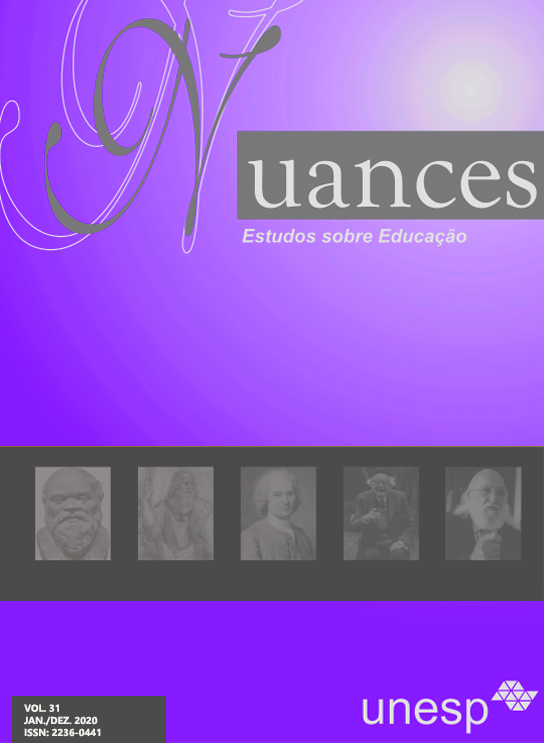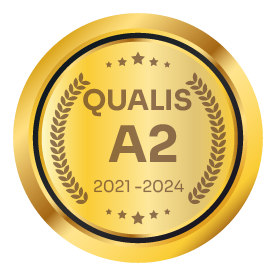Percepção das informações transmitidas pela mídia sobre a covid-19 e sua relação com o fatalismo causado pela pandêmica em estudantes universitários da cidade de Lima
DOI:
https://doi.org/10.32930/nuances.v31i0.8329Palavras-chave:
Covid-19, university students, fatalism, mediaResumo
The present study aims to determine the relationship between the perception of the information transmitted by mass media about Covid-19 and the fatalism originated by the pandemic in university students of Lima city. The composition of the population was 6,500 students, from which it was extracted a sample of 655 subjects, 310 males and 345 females, with ages between 16 and 32 years old (mean of 19.50 and standard deviation of 3.08) extracted from the first two cycles of four private universities and one public university of the city of Lima, by virtual way, in June 2020. The study is of non-experimental design at the relational level. The result obtained shows that there is a relationship between the perception of the information transmitted by the media about Covid-19 and the fatalism caused by the pandemic. The Spearman correlation is 0.238. The effect size is 0.4978. The statistical power is 0.9542, and these results can be generalized to the entire population of university students in the city of Lima.Downloads
Referências
AKESSON J., ASHWORTH-HAYES S., HAHN, R., METCALFE R., RASOOLY, I. Fatalism, Beliefs, and Behaviors During the Covid-19 Pandemic. NBER Working Paper, 2020, w27245. 10.3386/w27245
ALARCÓN R. Psicología, pobreza y subdesarrollo. Consejo Nacional de Ciencia y Tecnología. 1988.
ALFONSO-SÁNCHEZ I., FERNÁNDEZ-VALDÉS M. Comportamiento informacional, infodemia y desinformación durante la pandemia de COVID-19. Anales de la Academia de Ciencias de Cuba, vol. 10, n. 2, 2020. http://revistaccuba.sld.cu/index.php/revacc/article/view/882/888
ANDERSON R., HEESTERBEEK H., KLINKENBERG D., HOLLINGSWORTH, T. (2020). How will country-based mitigation measures influence the course of the COVID-19 epidemic? The Lancet, vol. 395, n. 10228, 2020, pp. 931-934. https://doi.org/10.1016/S0140-6736(20)30567-5
ARIAS-CHÁVEZ D., RAMOS-QUISPE T., VILLALBA-CONDORI K., POSTIGO-ZUMARÁN J. E. World scientific production on covid-19: Analysis of the period February-march, 2020. Journal of Critical Reviews, vol. 7, n. 9, 2020, pp. 64-69. 10.31838/jcr.07.09.11
BATTLE E., ROTTER J. Children feeling of personal control as related to socialclass and ethnic group. Journal of Personality, vol. 31, 1963, pp. 482–490. https://doi.org/10.1111/j.1467-6494.1963.tb01314.x
BRISCESE G., LACETERA N., MACIS, M., TONIN M. Compliance with COVID‐19 Social‐Distancing Measures in Italy: The Role of Expectations and Duration. Working Paper 26916. National Bureau of Economic, 2020. http://ftp.iza.org/dp13092.pdf
CAO W., FANG Z., HOU G., HAN M., XU X., DONG J., ZHENG J. The psychological impact of the COVID-19 epidemic on college students in China. Psychiatry Research, 2020, pp. 112934. https://doi.org/10.1016/j.psychres.2020.112934
CASERO-RIPOLLÉS A. Impact of Covid-19 on the media system. Communicative and democratic consequences of news consumption during the outbreak. El profesional de la información, vol. 29, n. 2, 2020, pp. 1-11. e290223. https://doi.org/10.3145/epi.2020.mar.23
DEL VALLE M. V., ANDRÉS M. L., URQUIJO S., YERRO-AVINCETTO M., LÓPEZ-MORALES H., CANET-JURIC L. Intolerance of uncertainty over COVID-19 pandemic and its effect on anxiety and depressive symptoms. Revista Interamericana de Psicología/Interamerican Journal of Psychology, vol. 54, n. 2, 2020, e1335. https://doi.org/10.30849/ripijp.v54i2.1335
DING Y., DU X., LI Q., ZHANG M., ZHANG Q., TAN X., LIU Q. (2020). Risk perception of coronavirus disease 2019 (COVID-19) and its related factors among college students in China during quarantine. PloS one, vol. 15, n. 8, 2020, e0237626. https://doi.org/10.1371/journal.pone.0237626
DOMÍNGUEZ L., AMADOR-BEDOLLA C. (2020). El origen de COVID-19: lo que se sabe, lo que se supone y (muy poquito) sobre las teorías de complot. Educación Química, vol. 31, n. 2, 2020, pp. 3-11. 10.22201/fq.18708404e.2020.2.75461
GISSI J. Psicosociología de la pobreza. Cuadernos de Psicología. Pontificia Universidad Católica de Chile, 1986.
GISSI J. Psicoantropología de la pobreza. Oscar Lewis y la realidad chilena. Psicoamerica, 1990.
GONZÁLEZ-JAIMES N., TEJEDA-ALCÁNTARA A., ESPINOSA-MÉNDEZ C., ONTIVEROS-HERNÁNDEZ Z. Impacto psicológico en estudiantes universitarios mexicanos por confinamiento durante la pandemia por Covid-19. 2020, 10.1590/SciELOPreprints.756
IGLESIAS M., GONZÁLEZ C. Radiografía del consumo de medios de comunicación en estudiantes universitarios. Icono 14, vol. 10, n. 3, 2012, pp. 100-115. 10.7195/ri14.v10i3.212
JIMENEZ T., RESTAR A., HELM P. J., CROSS R. I., BARATH D., ARNDT J. Fatalism in the context of COVID-19: Perceiving coronavirus as a death sentence predicts reluctance to perform recommended preventative behaviors. SSM - Population Health, 11, 2020. https://doi.org/10.1016/j.ssmph.2020.100615
KILGO D., YOO J., JOHNSON T. (2019). Spreading ebola panic: Newspaper and social media coverage of the 2014 ebola health crisis. Health Communication, vol. 34, n. 8, 2019, pp. 811-817. https://doi.org/10.1080/10410236.2018.1437524
KLINE P. The handbook of psychological testing (2da ed.). Routledge, 2002.
LÁZARO-RODRÍGUEZ P., HERRERA-VIEDMA E. Noticias sobre Covid-19 y 2019-nCoV en medios de comunicación de España: el papel de los medios digitales en tiempos de confinamiento. El profesional de la información, vol. 29, n. 3, 2020, e290302. https://doi.org/10.3145/epi.2020.may.02
LEWIS O. The culture of poverty. In D. Moyniham (Ed.), On understandingpoverty. Perspectives from the social sciences (pp. 187–199). BasicBooks, 1969.
LEWNARD J., LO N. (2020). Scientific and ethical basis for social-distancing interventions against COVID-19. The Lancet, vol. 20, n. 6, 2020, pp. 631-633. https://doi.org/10.1016/S1473-3099(20)30190-0
LUBENS P. Journalists and public health professionals: Challenges of a symbiotic relationship. Disaster Medicine and Public Health Preparedness, vol. 9, n. 1, 2015, pp. 59-63. 10.1017/dmp.2014.127.
MARTÍN-BARÓ I. Psicología del campesino salvadoreño. Estudios Centroamericanos, 1973.
MARTÍN-BARÓ I. Sistema, grupo y poder. Psicología social desde Centroamérica II, 1989.
MARTÍN-BARÓ I. Psicología de la liberación. Trotta, 1988.
MEJIA C. R., TICONA D., RODRÍGUEZ-ALARCÓN J. F., CAMPOS-URBINA A. M., CATAY-MEDINA J. B., PORTA-QUINTO T., GARAYAR-PECEROS H., IGNACIO-QUINTE C., CARRANZA-ESTEBAN R. F., RUIZ-MAMANI P. G., TOVANI-PALONE M. R. The Media andtheirInformative Role in the Face ofthe Coronavirus Disease 2019 (COVID19): Validation of Fear Perception and Magnitude of the Issue (MED-COVID-19). Electron J Gen Med, vol. 17, n. 6, 2020a. https://doi.org/10.29333/ejgm/7946
MEJÍA C. R., RODRÍGUEZ-ALARCÓN J. F., CARBAJAL M., PÉREZ-ESPINOZA P., PORRAS-CARHUAMACA L. A., SIFUENTES-ROSALES J., CONTRERAS-CABRERA J. M., CARRANZA-ESTEBAN R. F., RUIZ-MAMANI P. G. Fatalismo ante la posibilidad de contagio por el coronavirus: Generación y validación de un instrumento (F-COVID-19). Kasmera, vol. 48, n. 1, 2020b. http://doi.org/10.5281/zenodo.3732353
MEJÍA C. R., RODRIGUEZ-ALARCON J., GARAY-RIOS L., ENRIQUEZ-ANCO M., MORENO A., HUAYTAN-ROJAS K., HUANCAHUARI-ÑAÑACC HUARI N., JULCA-GONZALES A., ALVAREZ C., CHOQUE-VARGAS J., CURIOSO W. Percepción de miedo o exageración que transmiten los medios de comunicación en la población peruana durante la pandemia de la COVID–19. Revista Cubana de Investigaciones Biomédicas, vol. 39, n. 2, 2020c. http://scielo.sld.cu/scielo.php?script=sci_arttext&pid=S0864-03002020000200001&lng=es&tlng=es
MEJÍA C. R., QUISPE–SANCHO A., RODRÍGUEZ-ALARCÓN J. F., CCASA–VALERO L., PONCE–LÓPEZ V. L., VARELA–VILLANUEVA E.S., MARTICORENA-FLORES R., CHAMORRO-ESPINOZA S., AVALOS-REYES M. S., VERA-GONZALES JEAN J. Factores asociados al fatalismo ante la COVID-19 en 20 ciudades del Perú en marzo 2020. Rev Haban Cienc Méd, vol. 19, n. 2, 2020d, e_3233. http://scielo.sld.cu/scielo.php?script=sci_arttext&pid=S1729-519X2020000200015&lng=es&tlng=es
MERTENS G., GERRITSEN L., DUIJNDAM S., SALEMINK E., ENGELHARD I. M. Fear of the coronavirus (COVID-19): Predictors in an online study conducted in March 2020. Journal of Anxiety Disorders, vol. 74, 2020, 102258. https://doi.org/10.1016/j.janxdis.2020.102258
PULIDO RODRÍGUEZ C., VILLAREJO CARBALLIDO B., REDONDO-SAMA G., GUO M., RAMIS M., FLECHA R. False News Around COVID-19 Circulated Less On Sina Weibo Than On Twitter. How To Overcome False Information? International and Multidisciplinary Journal of Social Sciences, vol. 9, n. 2, 2020, pp. 1-22. http://dx.doi.org/10.17583/rimcis.2020.5386
RODRÍGUEZ CAHILL C. Five psychological challanges of the COVID-19 crisis. JONNPR, vol. 5, n. 6, 2020, pp. 583-88. https://doi.org/10.19230/jonnpr.3662
RAMÓN FERNÁNDEZ F. Comunicación y noticias falsas en relación al COVID-19: algunas reflexiones sobre la información, la desinformación y propuestas de mejora. Revista Española de Comunicación en Salud. Suplemento 1, 2020, pp. 253-264. https://doi.org/10.20318/recs.2020.5375
SHOREY S., ANG E., YAMINA A., TAM C. Perceptions of public on the COVID-19 outbreak in Singapore: a qualitative content analysis. Journal of Public Health, vol. 42, n. 4, 2020, pp. 665-671. 10.1093/pubmed/fdaa105
SOHRABI C., ALSAFI Z., O'NEILL N., KHAN M., KERWAN A., ALJABIR A., IOSIFIDOS C., AGHA R. World Health Organization declares global emergency: A review of the 2019 novel coronavirus (COVID-19). International Journal of Surgery, vol. 76, 2020, pp. 71-76. https://doi.org/10.1016/j.ijsu.2020.02.034
UNESCO. Covid y Educación Superior: de los efectos inmediatos al día después. Análisis de impactos, respuestas políticas y recomendaciones. 2020. http://www.iesalc.unesco.org/wp-content/uploads/2020/05/COVID-19-ES-130520.pdf
VALLEJO-MARTÍN M., MORENO-JIMÉNEZ M., RÍOS-RODRÍGUEZ M. L. Sentido de comunidad, fatalismo y participación en contextos de crisis socioeconómica. Psychosocial Intervention, vol. 26, n. 1, 2016, pp. 1–7. https://doi.org/10.1016/j.psi.2016.10.002
WESTLUND O., GHERSETTI M. Modelling news media use. Positing and applying the GC/MC model to the analysis of media use in everyday life and crisis situations. Journalism Studies, vol. 16, n. 2, 2015, pp. 133-151. https://doi.org/10.1080/1461670X.2013.868139
YILDIRIM M., GEÇER E., AKGÜL O. The impacts of vulnerability, perceived risk, and fear on preventive behaviours against COVID-19. Psychology, Health & Medicine, vol. 3, 2020, pp. 1-9. 10.1080/13548506.2020.1776891
Downloads
Publicado
Edição
Seção
Licença
Atribuição-NãoComercial
CC BY-NC
Esta licença permite que outros remixem, adaptem e criem a partir do seu trabalho para fins não comerciais, e embora os novos trabalhos tenham de lhe atribuir o devido crédito e não possam ser usados para fins comerciais, os usuários não têm de licenciar esses trabalhos derivados sob os mesmos termos.





